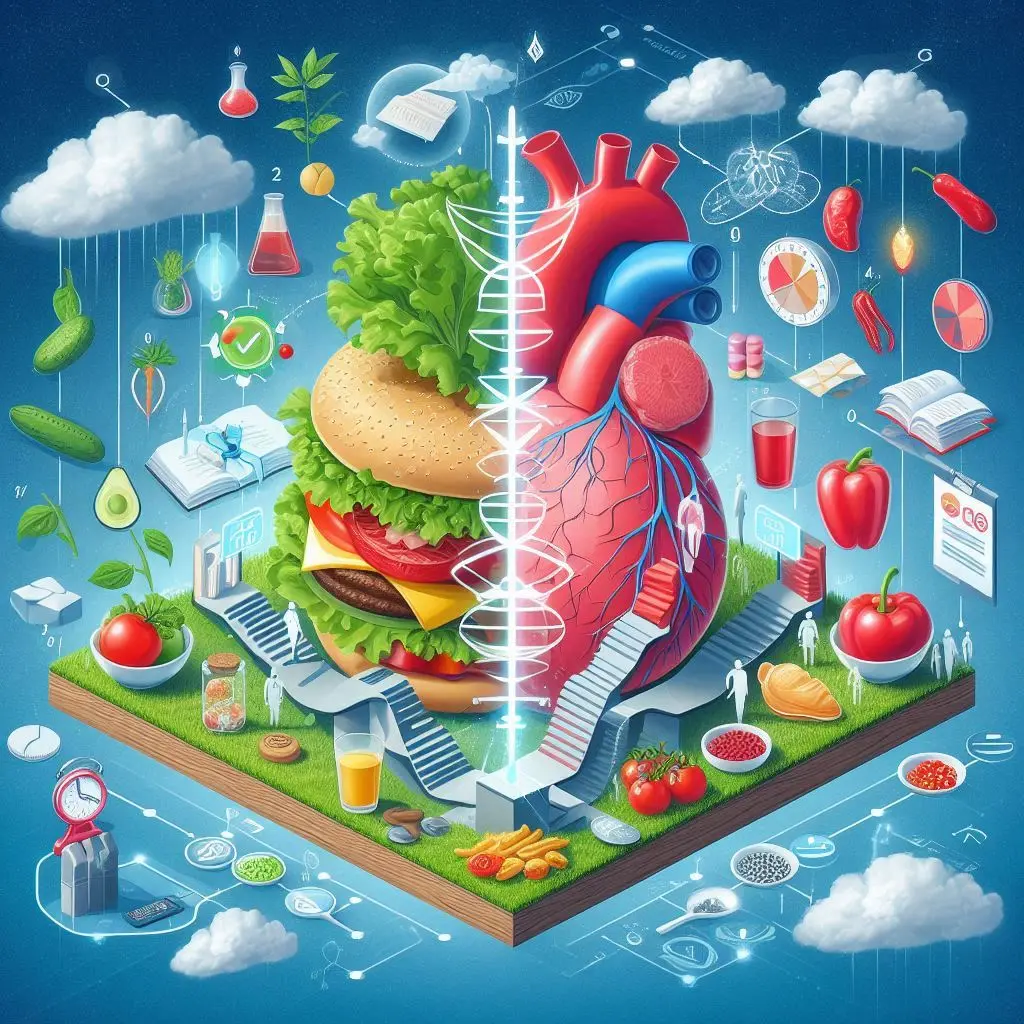Table of Contents
The Benefits of a Balanced Diet: Why It’s Essential for Your Health

A balanced diet is key to living a healthy life. It’s not just about eating the right amount of food, but also about making sure your body gets all the nutrients it needs. The benefits of a balanced diet are countless, ranging from weight management to improved energy levels and reduced risk of chronic diseases.
In this article, we’ll explore the numerous benefits of maintaining a balanced diet and how it can contribute to your overall health and well-being.
What Is a Balanced Diet?
A balanced diet is a way of eating that provides your body with the essential nutrients it needs to function properly. This means consuming the right amounts of macronutrients (carbohydrates, proteins, and fats) and micronutrients (vitamins and minerals) from a variety of food groups.
When you eat a balanced diet, you’re not only satisfying your hunger but also fueling your body with the right kind of energy to stay healthy.
Importance of a Balanced Diet
Maintaining a balanced diet is crucial for several reasons. It supports the body’s natural processes, keeps your energy levels steady, and helps in maintaining a healthy weight.
Moreover, a balanced diet is essential for preventing chronic diseases such as heart disease, diabetes, and certain cancers. By following dietary guidelines and making informed food choices, you can enjoy a healthier, more active life.
Benefit 1: Weight Management

One of the most significant benefits of a balanced diet is its role in weight management. Whether you are looking to lose weight or maintain a healthy weight, a balanced diet can help you achieve your goals.
How a Balanced Diet Aids in Weight Loss
When you eat a balanced diet, you’re more likely to consume the right number of calories without overeating. By focusing on whole foods like fruits, vegetables, whole grains, lean proteins, and healthy fats, you can reduce the intake of empty calories found in processed foods and sugary snacks.
These nutrient-dense foods keep you full longer, reducing the temptation to overeat, which is crucial for weight loss.
For example, consider a typical meal consisting of grilled chicken breast, steamed broccoli, and quinoa. This meal is not only rich in essential nutrients but also low in calories and high in fiber, which helps you feel full and satisfied.
Compare this to a meal of fast food, which might be high in calories but low in nutrients, leaving you hungry soon after eating.
Preventing Weight Gain with a Balanced Diet
A balanced diet also helps prevent weight gain by promoting healthy eating habits. By consuming a variety of foods from all food groups, you’re less likely to experience nutrient deficiencies that can lead to cravings and overeating.
Balanced meals stabilize blood sugar levels, reducing the likelihood of reaching for unhealthy snacks. This, in turn, supports long-term weight management and helps prevent obesity-related issues.
For instance, incorporating high-fiber foods like fruits, vegetables, and whole grains into your diet can slow down the absorption of sugar into your bloodstream, preventing spikes in blood sugar that often lead to hunger and overeating.
Additionally, including protein-rich foods in your meals can help build and maintain muscle mass, which burns more calories even at rest, further aiding in weight management.
Understanding Portion Control
Another critical aspect of weight management is portion control. Even healthy foods can lead to weight gain if consumed in excessive amounts.
A balanced diet emphasizes moderation, teaching you to recognize appropriate portion sizes and avoid overeating. By practicing portion control, you can enjoy a variety of foods without consuming too many calories.
For example, using smaller plates and serving sizes can help you naturally eat less without feeling deprived. Additionally, paying attention to hunger and fullness cues can prevent you from eating out of habit or boredom.
By being mindful of portion sizes and listening to your body, you can manage your weight more effectively.
Benefit 2: Improved Health

Eating a balanced diet is not just about maintaining a healthy weight; it’s also about improving your overall health. The nutrients you get from a balanced diet play a vital role in keeping your body functioning optimally.
Role of a Balanced Diet in Disease Prevention
A balanced diet can help prevent various chronic diseases. For example, a diet rich in fruits, vegetables, whole grains, and lean proteins can lower the risk of heart disease. These foods are high in fiber, antioxidants, and healthy fats, which help reduce cholesterol levels and inflammation.
Moreover, a balanced diet that includes low-fat dairy and leafy greens provides calcium and vitamin D, which are essential for bone health and can prevent osteoporosis.
Boosting Immune Function
A balanced diet also supports a healthy immune system. Nutrients like vitamins A, C, and E, along with minerals like zinc and selenium, play a crucial role in maintaining immune function.
These nutrients are found in abundance in fruits, vegetables, nuts, and seeds. By consuming a variety of these foods, you can help your body fight off infections and recover more quickly when you do get sick.
For example, vitamin C, found in citrus fruits and leafy greens, is known for its immune-boosting properties. It helps stimulate the production of white blood cells, which are essential for fighting off infections.
Similarly, zinc, found in nuts, seeds, and whole grains, is crucial for the development and function of immune cells. By incorporating these nutrient-rich foods into your diet, you can strengthen your immune system and reduce your risk of illness.
Supporting Mental Health
In addition to physical health, a balanced diet also plays a significant role in mental health. The brain requires a steady supply of nutrients to function optimally, and a balanced diet provides these essential nutrients.
For example, omega-3 fatty acids, found in fatty fish like salmon and flaxseeds, are known to support brain health and reduce the risk of depression and anxiety.
Moreover, a balanced diet that includes a variety of whole foods can help stabilize mood and improve cognitive function.
Foods rich in antioxidants, such as berries and dark leafy greens, protect the brain from oxidative stress, which can contribute to cognitive decline. By prioritizing a balanced diet, you can support both your physical and mental well-being.
Promoting Healthy Digestion
A balanced diet also promotes healthy digestion by providing the right mix of fiber, fluids, and nutrients. Fiber, found in fruits, vegetables, whole grains, and legumes, is essential for digestive health.
It adds bulk to the stool, making it easier to pass and preventing constipation. Moreover, a diet rich in fiber can promote the growth of healthy gut bacteria, which are crucial for overall digestive health.
Additionally, staying hydrated by drinking plenty of water and consuming water-rich foods, such as fruits and vegetables, helps keep the digestive system functioning smoothly.
By maintaining a balanced diet, you can support your digestive health and prevent common digestive issues like constipation, bloating, and indigestion.
Benefit 3: Increased Energy

A balanced diet is essential for maintaining high energy levels throughout the day. The foods you eat directly impact how your body produces and uses energy.
How Nutrients Fuel the Body
Carbohydrates are the body’s primary source of energy. When you consume whole grains, fruits, and vegetables, your body breaks down these carbohydrates into glucose, which is then used for energy.
A balanced diet ensures that you get enough carbohydrates to keep your energy levels stable. Additionally, proteins and fats also contribute to energy production, particularly during longer periods of activity.
For example, complex carbohydrates, such as those found in whole grains and legumes, are digested more slowly than simple carbohydrates, providing a steady release of energy throughout the day.
On the other hand, simple carbohydrates, found in sugary snacks and processed foods, can lead to quick spikes and drops in blood sugar, resulting in energy slumps.
Avoiding Energy Slumps
Eating a balanced diet can help prevent energy slumps. For example, a breakfast that includes whole grains, protein, and healthy fats can keep you energized until lunchtime.
On the other hand, consuming sugary snacks or highly processed foods can lead to a quick spike in blood sugar, followed by a crash, leaving you feeling tired and sluggish. By choosing nutrient-dense foods, you can maintain steady energy levels throughout the day.
Incorporating healthy snacks into your diet can also help sustain your energy levels. For instance, a handful of nuts, a piece of fruit, or a yogurt can provide a quick energy boost without causing a sugar crash. By opting for balanced snacks, you can avoid the mid-afternoon slump and stay productive throughout the day.
Supporting Physical Activity
A balanced diet is particularly important for those who engage in regular physical activity. The right mix of carbohydrates, proteins, and fats can enhance athletic performance and support recovery after exercise.
For example, consuming a meal or snack that includes both carbohydrates and protein after a workout can replenish glycogen stores and repair muscle tissue, helping you recover faster and perform better in your next workout.
Moreover, staying hydrated is crucial for maintaining energy levels during physical activity. Water is essential for regulating body temperature, transporting nutrients, and removing waste products.
By drinking enough water and consuming water-rich foods, you can stay hydrated and energized throughout your workouts.
Benefit 4: Reduced Risk of Chronic Diseases

One of the most critical benefits of a balanced diet is its ability to reduce the risk of chronic diseases. Many of these conditions are linked to poor dietary habits and can be prevented by making healthier food choices.
Heart Disease and Diet
Heart disease is one of the leading causes of death worldwide. However, a balanced diet can significantly reduce your risk. Foods high in fiber, such as whole grains, fruits, and vegetables, help lower cholesterol levels and improve heart health.
Additionally, consuming healthy fats, like those found in olive oil, nuts, and fatty fish, can reduce inflammation and prevent plaque buildup in the arteries.
For example, the Mediterranean diet, which emphasizes whole grains, fruits, vegetables, healthy fats, and lean proteins, has been extensively studied and is linked to a lower risk of heart disease.
This diet encourages the consumption of foods rich in monounsaturated fats, like olive oil, and omega-3 fatty acids, found in fatty fish such as salmon and mackerel.
These healthy fats help reduce inflammation and improve heart health by lowering LDL (bad) cholesterol levels while increasing HDL (good) cholesterol levels.
Additionally, the fiber in fruits, vegetables, and whole grains plays a crucial role in heart health by helping to regulate blood pressure and reduce cholesterol.
Soluble fiber, found in foods like oats, beans, and apples, can bind to cholesterol in the digestive system and remove it from the body, thus lowering overall cholesterol levels.
This not only reduces the risk of heart disease but also helps in maintaining healthy blood pressure levels.
Moreover, incorporating a variety of colorful fruits and vegetables into your diet provides essential antioxidants like vitamins C and E, which protect the heart by neutralizing free radicals that can damage cells and lead to cardiovascular disease.
By making heart-healthy food choices, you can significantly reduce your risk of developing heart disease and maintain a strong and healthy heart.
Diabetes Prevention and Management
A balanced diet is also a powerful tool in preventing and managing type 2 diabetes. Consuming a diet rich in whole grains, fruits, vegetables, and lean proteins can help regulate blood sugar levels and improve insulin sensitivity. This is particularly important for individuals at risk of developing diabetes or those already diagnosed with the condition.
For instance, foods with a low glycemic index (GI), such as whole grains, legumes, and non-starchy vegetables, are digested slowly and cause a gradual rise in blood sugar levels.
This helps in preventing sharp spikes in blood glucose and reduces the risk of insulin resistance, a key factor in the development of type 2 diabetes.
On the other hand, diets high in refined carbohydrates and sugars can lead to rapid increases in blood sugar levels, which over time, can contribute to the development of diabetes.
By replacing refined grains with whole grains and choosing natural sources of sweetness like fruits, you can better manage your blood sugar levels and reduce the risk of diabetes.
For individuals with diabetes, a balanced diet that includes regular meals and snacks spaced evenly throughout the day can help maintain steady blood sugar levels.
Additionally, incorporating lean proteins and healthy fats into meals can further stabilize blood sugar and provide sustained energy.
Cancer Prevention
Another critical benefit of a balanced diet is its role in cancer prevention. Certain dietary patterns have been shown to reduce the risk of developing various types of cancer.
A diet rich in fruits, vegetables, whole grains, and legumes provides an abundance of vitamins, minerals, and antioxidants that protect the body from cancer-causing agents.
For example, cruciferous vegetables like broccoli, cauliflower, and Brussels sprouts contain compounds known as glucosinolates, which have been found to have cancer-fighting properties. These vegetables help detoxify the body and protect cells from DNA damage that can lead to cancer.
Similarly, foods high in fiber, such as whole grains, fruits, and vegetables, can reduce the risk of colorectal cancer by promoting healthy digestion and regular bowel movements.
Fiber helps to remove waste and potential carcinogens from the digestive tract, reducing the time they spend in contact with the lining of the colon.
Additionally, a balanced diet that limits the intake of red and processed meats can lower the risk of certain cancers, including colorectal and stomach cancer.
Processed meats are often high in preservatives like nitrates, which have been linked to an increased risk of cancer. By focusing on plant-based proteins like beans, lentils, and tofu, and including lean meats and fish in moderation, you can reduce your cancer risk and support overall health.
Bone Health and Osteoporosis Prevention
A balanced diet also plays a vital role in maintaining strong bones and preventing osteoporosis, a condition characterized by weak and brittle bones.
Adequate intake of calcium and vitamin D is essential for bone health, and these nutrients are most effective when consumed as part of a balanced diet.
Dairy products like milk, yogurt, and cheese are well-known sources of calcium, but you can also obtain calcium from leafy green vegetables like kale and broccoli, as well as fortified foods like almond milk and orange juice.
Vitamin D, which helps the body absorb calcium, can be found in fatty fish like salmon, egg yolks, and fortified foods. Additionally, spending time in the sun can help your body produce vitamin D naturally.
A diet that includes a variety of nutrient-rich foods can also provide other important nutrients for bone health, such as magnesium, phosphorus, and vitamin K.
Magnesium, found in nuts, seeds, and whole grains, plays a role in converting vitamin D into its active form, which helps the body absorb calcium. Vitamin K, found in leafy greens, is important for bone formation and helps regulate calcium balance in the body.
By ensuring that your diet includes a mix of these nutrients, you can support bone health and reduce the risk of osteoporosis and fractures, especially as you age.
Digestive Health and Gut Microbiome
A balanced diet is essential for maintaining a healthy digestive system and supporting a diverse gut microbiome. The gut microbiome is a community of trillions of bacteria and other microorganisms that live in the digestive tract and play a crucial role in digestion, immune function, and overall health.
A diet rich in fiber, particularly from whole grains, fruits, vegetables, and legumes, provides the necessary fuel for beneficial gut bacteria. These bacteria ferment fiber, producing short-chain fatty acids (SCFAs) that nourish the cells lining the gut and help maintain the integrity of the gut barrier.
Moreover, fermented foods like yogurt, kefir, sauerkraut, and kimchi are excellent sources of probiotics, which are live bacteria that can support a healthy gut microbiome.
Including these foods in your diet can promote a diverse and balanced gut microbiome, which is associated with better digestion, improved immune function, and a lower risk of chronic diseases.
In contrast, diets high in processed foods, sugars, and unhealthy fats can negatively impact gut health by promoting the growth of harmful bacteria and reducing microbial diversity.
This imbalance in the gut microbiome, known as dysbiosis, has been linked to various health issues, including inflammatory bowel disease, obesity, and mental health disorders.
By prioritizing a balanced diet that includes plenty of fiber-rich foods, fermented foods, and a variety of plant-based foods, you can support a healthy gut microbiome and promote optimal digestive health.
Embrace the Benefits of a Balanced Diet

In conclusion, the benefits of a balanced diet extend far beyond just maintaining a healthy weight. By providing your body with the essential nutrients it needs, a balanced diet can improve your overall health, increase energy levels, reduce the risk of chronic diseases, and support mental and digestive health.
Adopting a balanced diet doesn’t have to be complicated. Start by incorporating a variety of whole foods into your meals, focusing on fruits, vegetables, whole grains, lean proteins, and healthy fats.
Pay attention to portion sizes, listen to your body’s hunger and fullness cues, and make mindful choices when it comes to food.
Remember, small changes can lead to significant improvements in your health. Whether you’re aiming to manage your weight, boost your energy levels, or reduce your risk of chronic diseases, a balanced diet is your foundation for a healthier, more vibrant life.
By embracing the principles of healthy eating and making informed choices, you can enjoy the numerous benefits of a balanced diet and live a longer, healthier life.
So, take the first step today towards a healthier lifestyle. Your body, mind, and overall well-being will thank you for it.




